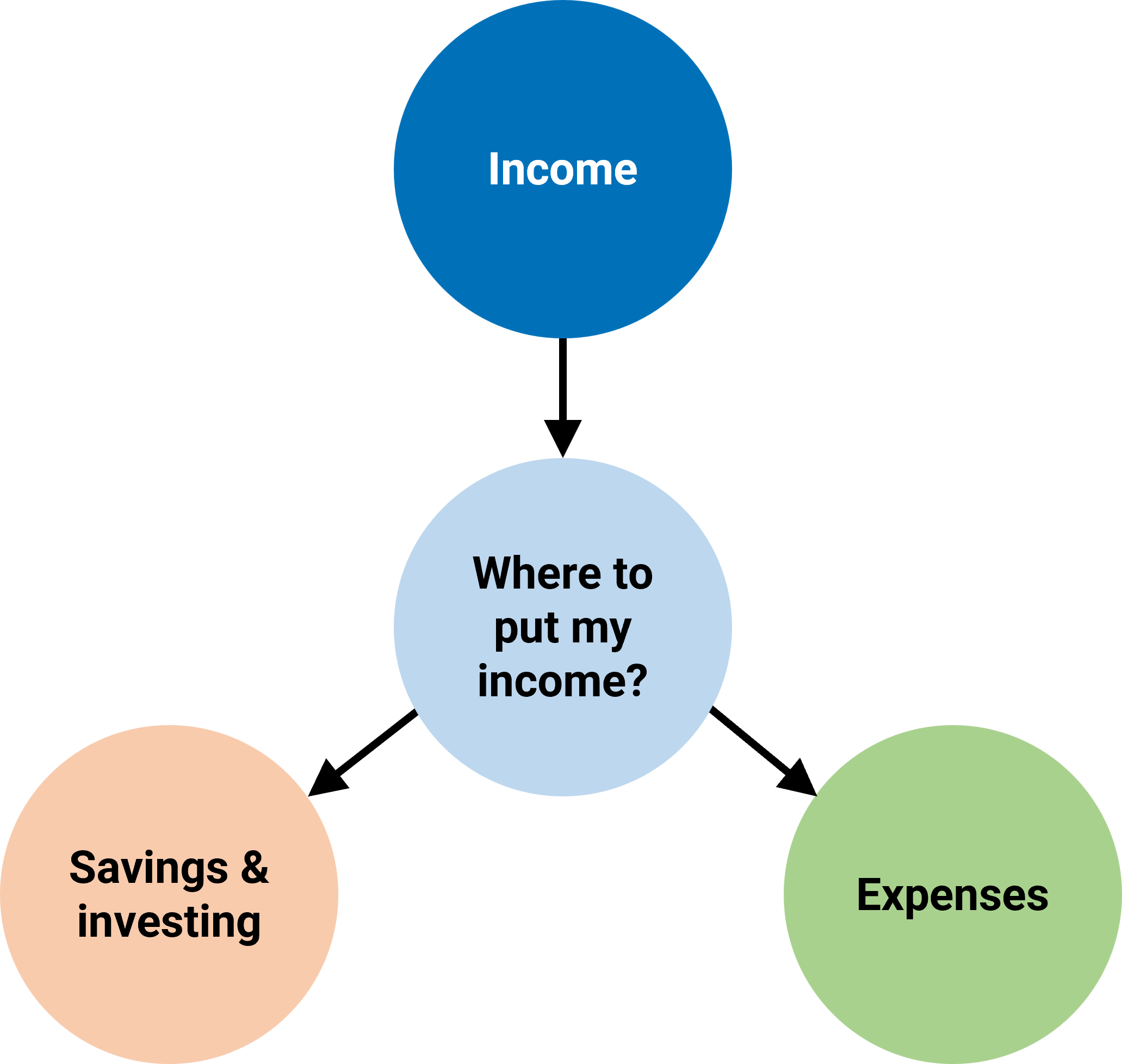7.6 Savings, Expenses, and Budgeting
Questions to consider:
- How is the flow of my money best measured?
- How do I keep things balanced?
Budgets
The term “budget” is unpleasant to some people because it looks like work. But who will care more about your money than you? We all want to know if we have enough money to pay our bills, travel, get an education, buy a car, or other necessities. Technically, a budget is a specific financial plan for a set period. Budgets have three elements: income, saving and investing, and expenses. To help get started on a budget, you may want to use an app, such as Rocket Money or EveryDollar for budgeting and Empower for investments.

Income
Income most often comes from our jobs in the form of a paper or electronic paycheck. When listing your income for your monthly budget, you should use your net pay, also called your disposable income. It is the only money you can use to pay bills. If you currently have a job, look at your pay stub or statement. You will find gross pay, followed by some money deducted for a variety of taxes, leaving a smaller amount—your net pay.
Some individuals receive disability income, Social Security income, investment income, alimony, child support, and other forms of payment on a regular basis. All these go under income. During school, you may receive support from family that could be considered income. You may also receive scholarships, grants, or student loan money.
Saving and Investing
The first bill you should pay is to yourself. You owe yourself today and in the future. This means you should set aside a certain amount of money for savings and investments, before paying bills and making discretionary or optional purchases. Savings can be for an emergency fund or for short-term goals, such as education, a wedding, travel, or a car. Investing, such as putting your money into stocks, bonds, or real estate, offers higher returns at a higher risk than money saved in a bank. Investments include retirement accounts that can be automatically funded with money deducted from your paycheck. Automatic payroll deductions are an effective way to save money before you can get your hands on it. Paying yourself first is a habit that pays off!
Expenses
Expenses are categorized in two ways. One method separates them into fixed expenses and variable expenses. Rent, insurance costs, cell phone bills, and utilities (power, water) are fixed: they cost about the same every month and are predictable based on your arrangement with the provider. Variable expenses, on the other hand, change based on your priorities and available funds; they include groceries, restaurants, gas, clothing, and so on. You have a good degree of control over your variable expenses. You can begin organizing your expenses by categorizing each one as either fixed or variable.
A second way to categorize expenses is to identify them as either needs or wants. Your needs come first: food, basic clothing, safe housing, medical care, and water. Your wants come afterward, provided you can afford them while sticking to a savings plan. Wants may include meals at a restaurant, designer clothes, video games, other forms of entertainment, or a new car. After you identify an item as a need or want, you must exercise self-control to avoid caving to your desire for too many wants.
Activity 7.2
List the last ten purchases you made, and place each of them in the category you think is correct.
| Item | Need Expense $ | Want Expense $ |
|---|---|---|
| Totals |
How do your total “need” expenses compare with your total “want” expenses? Should either of them change?
Balancing Your Budget
Would you take all your cash outside and throw it in the air on a windy day? Probably not. We want to hold on to every cent and decide where we want it to go. Our budget allows us to find a place for each dollar. We should not regularly have money left over. If we do, we should consider increasing our saving and investing. We should also avoid having a negative balance, meaning we don’t have enough to pay our bills. If we are short on money, we can review all three categories of our budget: income, savings, and expenses.
We could increase our income by taking a second job or working overtime; however, this is rarely advisable alongside college coursework as the time commitment quickly becomes overwhelming. Another option is to cut savings, or there’s always the possibility of reducing expenses. Any of these options, in combination, can work.
Another even less desirable option is to take on debt to make up the shortfall. This is usually only a short-term solution that worsens future months and cash shortages as we pay off the debt. When we budget for each successive month, we can look at what we actually spent the month before and make adjustments.
 Analysis Question
Analysis Question
Can you identify areas in your life where you are losing money by paying fees on your checking account or interest on your loans? What actions could you take to stop giving away money and instead set yourself up to start earning money?
Quick Quiz 7.4
- What are the five steps in a financial plan?
- What is the purpose of a financial plan?
- Explain the three components of a budget.
Licenses and Attribution
CC Licensed Content
- College Success by Amy Baldwin is licensed CC BY. Access for free.
Images or Graphic Elements
- Images used by permission from Alamo Colleges District Department of Communications.

